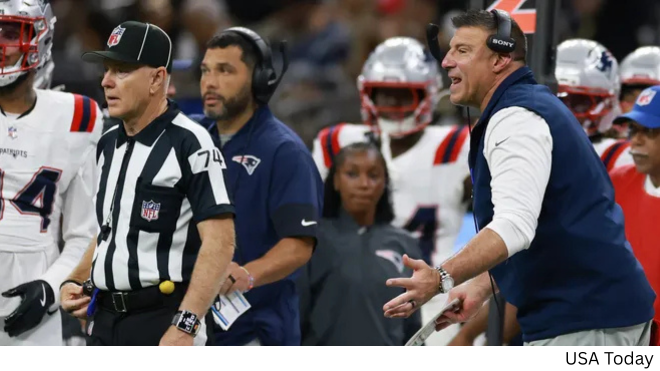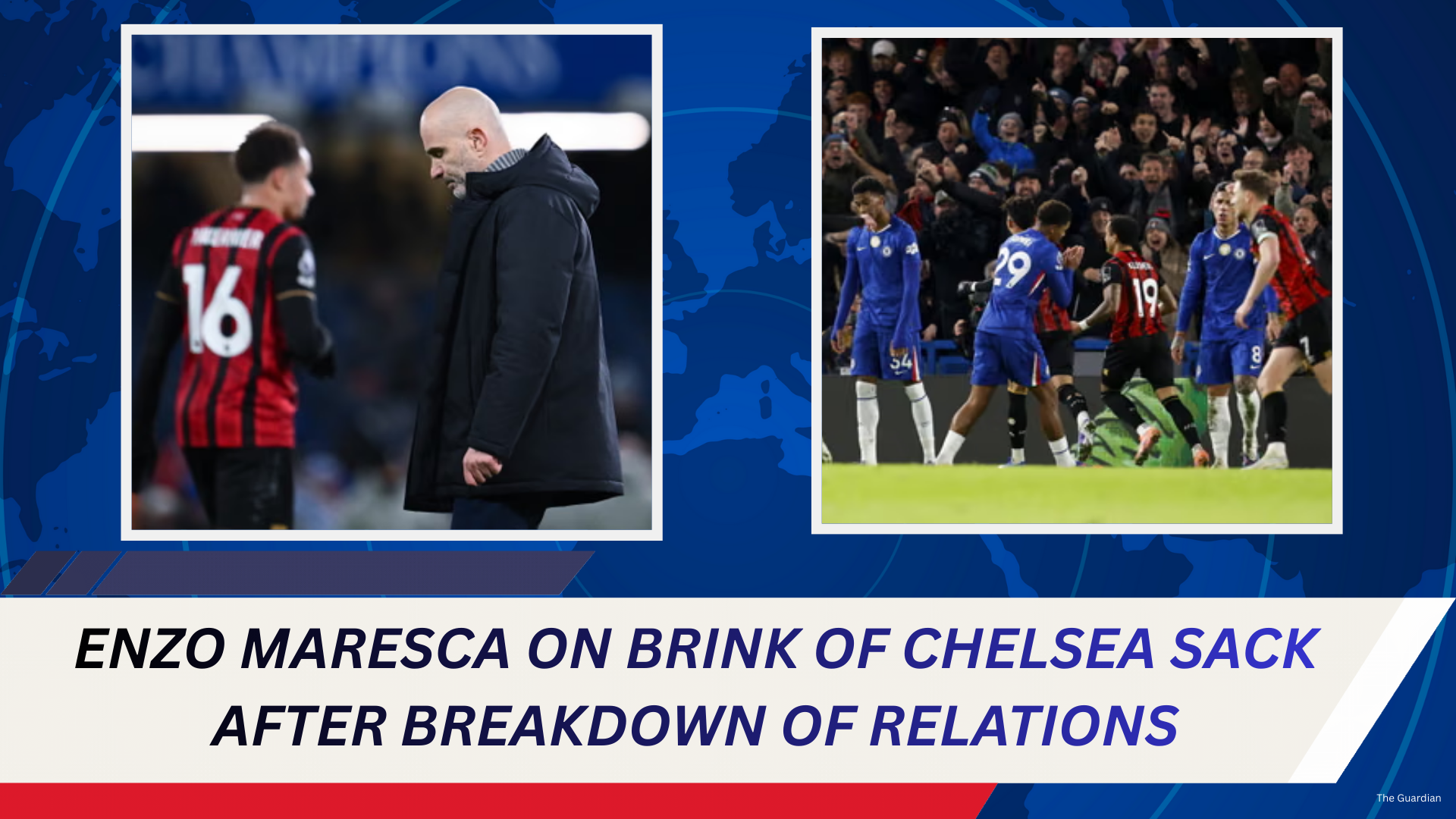The New England Patriots improved to 4-2 on the season with a 25-19 victory over the New Orleans Saints—but instead of celebrating the win, head coach Mike Vrabel found himself venting about something that has long frustrated coaches across the NFL: inconsistent officiating.
During his weekly appearance on WEEI radio, Vrabel didn’t mince words when asked what could be done to fix the league’s growing officiating concerns. After a game filled with questionable calls—including two crucial offensive pass interference penalties that erased long gains—Vrabel’s tone reflected a mix of humor, disbelief, and irritation.
“I got a tough enough job to coach this football team,” Vrabel said, half-joking but clearly exasperated. “There’s not much [you can do]. It becomes comical, at a point.”
A Win Overshadowed by Flags
While the Patriots’ win should have been the story, it was the officiating crew that stole the spotlight. In what was otherwise a hard-fought and disciplined performance, two pivotal penalties changed the complexion of the game—both called against star receiver Stefon Diggs.
The first came early in the game when rookie quarterback Drake Maye connected with DeMario Douglas on what looked like a highlight-reel 61-yard touchdown. The crowd roared, Douglas sprinted into the end zone, and for a moment, the Patriots appeared to seize early momentum. But the celebration was short-lived.
Officials threw a flag for offensive pass interference (OPI), ruling that Diggs had been “blocking downfield” before the pass was thrown. The touchdown was wiped away, and the Patriots’ drive stalled.
Referee Adrian Hill explained the decision after the game in the official pool report, saying:
“On that play, we ruled blocking downfield by No. 8 early during the play. If there is a situation where a player blocks downfield, it’s not a foul until a pass is thrown. So you kind of put that in the bank. And then the pass was thrown downfield later—that created the offensive pass interference.”
Later, Diggs appeared to redeem himself with a 51-yard reception, only to have that play also negated by another OPI call. Both penalties drew loud boos from fans and visible frustration from Vrabel on the sideline.
Vrabel’s Frustration: “Did They Even Watch the Video?”
In his radio interview, Vrabel explained that the Patriots coaching staff invests significant time each week reviewing officiating training videos distributed by the NFL. These clips are meant to clarify how specific rules are applied and interpreted. But according to Vrabel, what he sees on those tapes doesn’t match what happens on Sundays.
“Me and Stretch—we’re pausing it, rewinding it, like, ‘Ah, I love these videos,’” Vrabel said, referring to John Streicher, the Patriots’ vice president of football operations and strategy. “And then I’ll see something in the game and I’m like, ‘Did they even watch the video? They talked about this exact thing last week.’”
Vrabel’s comment struck a chord with many around the league, as it highlighted a growing concern among coaches: the lack of consistency between the league’s instructional materials and the actual enforcement of the rules during games.
The Broader Issue: Officiating Under the Microscope
The Patriots-Saints game is just the latest in a long string of NFL matchups marred by controversial calls this season. Across the league, players and coaches have voiced frustration over the lack of clear standards for penalties like pass interference, roughing the passer, and holding.
While the NFL has emphasized player safety and fairness, the implementation of those principles often feels murky. Each officiating crew seems to interpret situations differently, leading to confusion for teams and fans alike.
Vrabel’s comments, though delivered with humor, underscore a serious issue: the disconnect between the league’s officiating guidelines and in-game application.
Former players and analysts have backed Vrabel’s sentiment, noting that subjective penalties like offensive pass interference can dramatically alter the outcome of a game. “When you take away two plays of 50-plus yards for something that looks like incidental contact, you’re not just making a call—you’re changing the scoreboard,” one analyst said during a postgame broadcast.
Stefon Diggs’ Measured Response
While Vrabel expressed open frustration, Diggs took a more measured approach when speaking with reporters after the game. “I don’t really be tripping, to be honest,” he said, via MassLive. “I try my best to make plays and catch the ball when they come to me. When I get [back], hopefully we can submit them to the league to see if it was supposed to be called or not. But I don’t cry over spilled milk.”
Diggs’ professionalism stood out, but his comments also hinted at a quiet disbelief. Submitting questionable plays to the league office for review is common practice—but rarely do those reviews lead to meaningful changes or public acknowledgment of officiating errors.
Vrabel’s History of Speaking His Mind
For those familiar with Vrabel, his blunt honesty came as no surprise. Throughout his coaching career—first in Tennessee and now in New England—he’s been known for holding both his players and the league accountable. His willingness to call out officiating inconsistencies reflects both his competitive nature and his commitment to fairness.
Vrabel’s comments are unlikely to sit well with league officials, however. The NFL has previously fined coaches for public criticism of referees, even when their comments were made in jest. Still, Vrabel’s credibility as a former player and veteran coach gives his words extra weight in the ongoing conversation about officiating standards.
A Call for Accountability
Many around the league have echoed Vrabel’s implicit call for greater transparency in officiating. Some suggest the NFL should require referees to participate in postgame press conferences to explain controversial decisions—similar to how players and coaches must answer questions after every game.
Others propose implementing real-time replay consultations with the league’s officiating command center to reduce errors on subjective calls. While such measures have been discussed in the past, the NFL has been slow to adopt major reforms.
The Road Ahead for the Patriots
Despite the controversy, Vrabel’s Patriots find themselves in a strong position at 4-2, buoyed by improved quarterback play from Maye and a rejuvenated defense. But as the team prepares for a stretch of tough opponents, Vrabel’s frustration serves as a reminder that even a well-coached, disciplined team can be undone by inconsistencies beyond its control.
“We can’t coach the officials,” Vrabel said flatly. “We can only coach our team.”
For now, the Patriots will focus on maintaining their momentum—but the conversation Vrabel reignited about officiating consistency won’t fade anytime soon. His comments have amplified a league-wide concern that the NFL will eventually need to address more directly.
%20(4).png)




.png)

.png)
.png)
